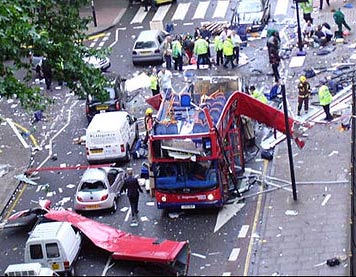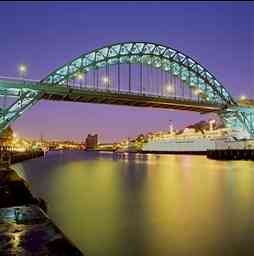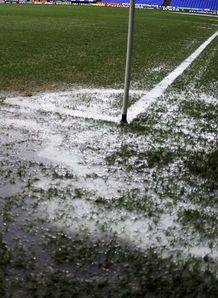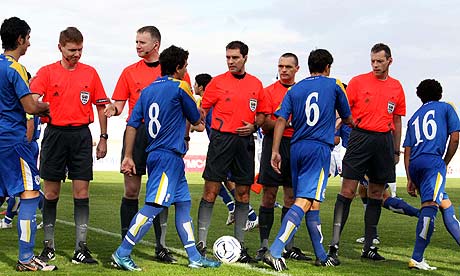2000
The Millenium Bug is nothing near the threat that computer 'experts' were predicting. Google begins selling advertising against search results, which helps it buy out various companies and quickly become the people's choice for online searching. Big Brother launches and results in a number of sequels throughout the decade and a huge race controversy. Dr Harold Shipman is given life imprisonment for murdering 15 patients and is later found hanged in 2004. George Bush succeeds Bill Clinton as US President. Blockades by protestors result in a UK fuel crisis after panic-buying. 113 people are killed after Concorde crashes in Paris.
2001
Terrorists bring down the World Trade Centre on 9/11, in a devastating attack
 that contributes hugely towards much foreign policy throughout the decade and kills 3,000 people [pictured]. Tony Blair wins a second election as British Prime Minister. America joins forces with the UK to launch a retaliatory war in Afghanistan against the Taliban. The foot-and-mouth crisis causes big problems for farmers as the agriculture industry tries to survive.
that contributes hugely towards much foreign policy throughout the decade and kills 3,000 people [pictured]. Tony Blair wins a second election as British Prime Minister. America joins forces with the UK to launch a retaliatory war in Afghanistan against the Taliban. The foot-and-mouth crisis causes big problems for farmers as the agriculture industry tries to survive.2002
The Queen Mother passes away and her funeral is held in Westminster Abbey. The bodies of Jessica Chapman and Holly Wells are found after they were murdered by school caretaker Ian Huntley, in an event that shocks the town of Soham in Cambridgeshire [pictured]. The Euro currency comes into use across 12 of the European Union countries. 202 people are killed in Bali by terrorists.
2003
World opinion is split as Iraq is invaded by 250,000 US troops and 45,000
2004
Facebook is invented and revolutionises the way we communicate with friends and relatives. Paul Foot, one of the country’s most successful investigative journalists, dies aged 66. Hundreds of thousands die in the Asian Tsunami on Boxing Day. The Madrid train bombings put transport networks worldwide on even higher alert than after 9/11, after 191 people are killed. The siege of Beslan school in eastern Europe sees 334 die.
2005
The football world unites to pay its respects to George Best, who passes away aged
 59. 7/7 brings London to a standstill as we experience a major terrorist attack on our transport system and 56 people die [pictured]. Hurricane Katrina sweeps through New Orleans and becomes one of the deadliest in the country's history. Pope Benedict XVI takes over as pontiff after John Paul II dies. London wins the bid for the 2012 Olympics. Prince Charles marries Camilla Parker Bowles.
59. 7/7 brings London to a standstill as we experience a major terrorist attack on our transport system and 56 people die [pictured]. Hurricane Katrina sweeps through New Orleans and becomes one of the deadliest in the country's history. Pope Benedict XVI takes over as pontiff after John Paul II dies. London wins the bid for the 2012 Olympics. Prince Charles marries Camilla Parker Bowles.2006
Southend United beat Manchester United 1-0 in one of the biggest football cup upsets of the decade. Alexander Litvinenko dies after suspected poisoning after eating in a sushi restaurant. The Nintendo Wii heralds a new era in motion-sensitive video gaming. Israel goes to war with Hezbollah in Lebanon. A stranded whale in the River Thames dies despite the efforts of a rescue team.
2007
Madeleine McCann is taken from her family's holiday apartment in Portugal and has
 still not been found after a two-year global hunt [pictured]. Gordon Brown hands over the Treasury to Alistair Darling. Northern Rock requires emergency government funding to stay afloat and economic concerns begin to grow. The political crisis in Zimbabwe results in hyper-inflation and accusations of tyranny against Robert Mugabe. The BBC iPlayer goes live and dramatically changes how we view content and the future of television. Benazir Bhutto is assassinated in Pakistan on a dark day for politics. 32 die in the Virginia Tech college massacre.
still not been found after a two-year global hunt [pictured]. Gordon Brown hands over the Treasury to Alistair Darling. Northern Rock requires emergency government funding to stay afloat and economic concerns begin to grow. The political crisis in Zimbabwe results in hyper-inflation and accusations of tyranny against Robert Mugabe. The BBC iPlayer goes live and dramatically changes how we view content and the future of television. Benazir Bhutto is assassinated in Pakistan on a dark day for politics. 32 die in the Virginia Tech college massacre.2008
The collapse of Lehman Brothers paves the way for a recession which causes huge job losses and stock exchange crashes around the world. Barack Obama is voted in as American president and Democrats welcome a new era of politics. China welcomes the world for the Beijing Olympics and it's a rare chance for foreign cameras to picture modern life in the country. Russia invades Georgia over the breakaway region, South Ossetia.
2009
The Copenhagen summit tries to unite the world in battle against climate change and glo
 bal warming. The pop music world mourns the losses of Michael Jackson [pictured] and Boyzone's Stephen Gately. The swine flu pandemic from Mexico causes worldwide panic. Cumbria is flooded and Eurostar trains get stuck under the English Channel after extreme winter weather conditions.
bal warming. The pop music world mourns the losses of Michael Jackson [pictured] and Boyzone's Stephen Gately. The swine flu pandemic from Mexico causes worldwide panic. Cumbria is flooded and Eurostar trains get stuck under the English Channel after extreme winter weather conditions.Bring on the ‘tens’.



























 the Thatcher era or, indeed, France. Please may I send a letter home? No you’ll have to wait because some people aren’t happy with their pay, conditions and modernisation. Please may I take the London Underground? No, you’ll have to walk because some workers aren’t happy with job losses, pay and disciplinary issues. Please may I fly with British Airways? No, there’s some cost-cutting measures that cabin crews have to sort out, so there might be a strike on there soon as well.
the Thatcher era or, indeed, France. Please may I send a letter home? No you’ll have to wait because some people aren’t happy with their pay, conditions and modernisation. Please may I take the London Underground? No, you’ll have to walk because some workers aren’t happy with job losses, pay and disciplinary issues. Please may I fly with British Airways? No, there’s some cost-cutting measures that cabin crews have to sort out, so there might be a strike on there soon as well.















